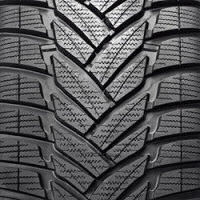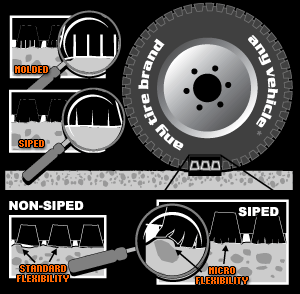Tire Tread Depends On The Contact Surface And
Application
Lets just go through the seasons and conditions and talk about the best
tread for stability and traction.(Winter Tire Tread)

http://www.thevalleyvoice.ca/images/
- Winter, the most brutal for driving conditions.
- Snow and winter tires have tread specifically designed to dig
down and conform to the ice and snow. They are made from softer
compounds so they retain their flexibility in cold conditions adding
traction. Snow and ice decreases the coefficient of friction, making a
slippery surface for tires. Like we talked about before ABS brakes and
traction control
do nothing without the right tires, especially in winter conditions.
- Summer, everyday driving conditions.
- Summer tires are made of harder compounds for there is more
heat generated. The coefficient of friction on dry pavement to rubber
is very high and tires work well as they are intended. Tires intended
for dry weather are made with minimal
patterns to increase the contact surface.
- Wet Conditions.
- Tires made for rain and wet conditions have deep grooves that
expel the water away
from the tires to prevent hydroplaning.
- Siping
- Siping is a aftermarket form of adding traction to winter
tires. Siping is the act of professionally slicing many small slits in
the tire tread. Siping has proved its ability on icy conditions and
also helps with heat dissipation, but it takes away from dry pavement
stopping distance.

http://www.lesschwab.com/siping/siping3.gif
